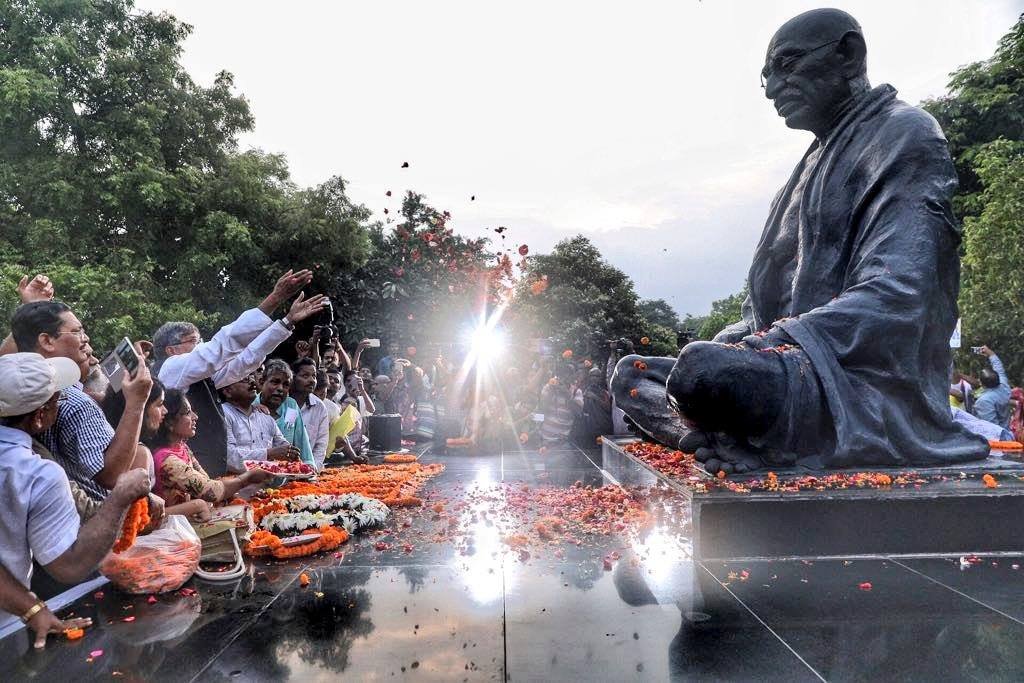Lok Sabha Even as speculation over who will be the next Speaker continues, the Opposition India bloc has emphasized that the crucial post in the Lok Sabha should be allocated to BJP-led NDA partners the Janata Dal (United) and the Telugu Desam Party (TDP).

(Photo Credit: Mint)
The newly-elected 18th Lok Sabha is gearing up for a significant milestone as it prepares to elect its new Speaker on June 26. This pivotal event will take place during the inaugural session, which runs from June 24 to July 3. The election of the Speaker is a crucial moment, setting the tone for the legislative activities and discussions that will shape the future of the country.
As the Lok Sabha convenes for its first session, all eyes will be on the proceedings, with members of parliament coming together to select the individual who will preside over the house. The role of the Speaker is vital in maintaining order, facilitating debates, and ensuring that the legislative process runs smoothly.
This inaugural session marks the beginning of a new chapter in India’s democratic journey. The election of the Speaker will be a defining moment, reflecting the collective decision of the representatives chosen by the people. It’s an exciting time as the newly-elected members take their seats, ready to address the challenges and opportunities that lie ahead.
Amid ongoing speculation about the next Speaker of the Lok Sabha, the opposition INDIA bloc has highlighted the importance of allocating this crucial post to the Bharatiya Janata Party (BJP)-led National Democratic Alliance (NDA) partners. Specifically, they have suggested that the Janata Dal (United) and the Telugu Desam Party (TDP) should be considered for this significant role.
Why does the speaker’s post matter this time?
In a significant shift from the previous two Narendra Modi-led governments, the current Union government is now reliant on its allies, marking a departure from the BJP’s earlier outright majority. The BJP secured 240 Lok Sabha seats in the recently concluded 2024 elections, falling 32 seats short of the majority mark. The election results, announced on June 4, have reshaped the political landscape, highlighting the crucial role of coalition partners in the new administration
This outcome underscores the importance of regional allies like Andhra Pradesh Chief Minister N. Chandrababu Naidu’s Telugu Desam Party (TDP) and Bihar Chief Minister Nitish Kumar’s Janata Dal (United) [JD (U)]. The TDP and JD(U) won 16 and 12 seats, respectively, emerging as key stakeholders of the third Modi-led government. Their combined 28 seats, are pivotal in bolstering the BJP’s position in the Lok Sabha, making these parties essential allies in the governance framework.
The reliance on coalition partners is a notable change for Prime Minister Narendra Modi, whose previous terms were characterized by the BJP’s clear majority in the Lok Sabha. This new dynamic necessitates a more collaborative approach to governance, as the BJP must now work closely with its allies to ensure legislative success and stability. The inclusion of the TDP and JD (U) not only strengthens the NDA but also brings diverse regional perspectives to the national stage, potentially influencing policy decisions and legislative priorities.
N. Chandrababu Naidu’s TDP and Nitish Kumar’s JD (U) have long been influential in their respective states. Their inclusion in the Union government signifies a broader representation of regional interests at the national level. For Andhra Pradesh and Bihar, this translates into greater leverage and influence in central policy-making, potentially benefiting their local development agendas.
This coalition approach also reflects the evolving political landscape of India, where regional parties play an increasingly significant role in shaping national politics. The BJP’s need to collaborate with allies like the TDP and JD (U) indicates a more inclusive and potentially more representative government, which could lead to policies that better address the diverse needs of India’s states.
As the new Lok Sabha session begins, the focus will be on how these alliances navigate the complexities of governance. The election of the new Speaker, slated for June 26, will be an early test of this collaborative effort. With the inaugural session running from June 24 to July 3, the legislative dynamics and the interplay between the BJP and its allies will set the tone for the coming years.
What do the allies say?
TDP leaders have emphasized that the candidate for Lok Sabha Speaker should be a joint decision made by all NDA partners. In contrast, JD (U) leader KC Tyagi has suggested that their party might support the candidate nominated by the BJP. This difference in approach highlights the nuanced dynamics within the NDA coalition, reflecting varying degrees of influence and negotiation among its members.
The TDP’s call for a collaborative decision underscores its desire for a more inclusive selection process, ensuring that all voices within the alliance are heard. On the other hand, the JD’s (U) willingness to back the BJP’s nominee indicates a flexible stance, potentially aimed at maintaining harmony within the coalition.
As the election for the new Lok Sabha Speaker approaches on June 26, these differing perspectives will play a crucial role in shaping the outcome, illustrating the complexities of coalition politics in the Modi-led government.
How is the Lok Sabha Speaker elected?
The election of the Lok Sabha Speaker is a pivotal process governed by Article 93 of the Indian Constitution. This post becomes vacant just before the new Lok Sabha convenes for its first session, which in the current scenario is on June 24.
Before the session begins, the President appoints a pro-tem speaker whose primary responsibility is to administer the oath of office to the newly elected Members of Parliament (MPs). For the session starting on June 24, the initial two days—June 24 and June 25—will be dedicated to the oath-taking ceremony for these newly elected MPs. This tradition ensures that all MPs are formally inducted before participating in legislative duties.
The critical election for the new Speaker of the Lok Sabha is scheduled for June 26. To participate in this election, members must submit notices for motions supporting their preferred candidates by noon on June 25, one day before the election. This deadline ensures a structured and timely election process.
Electing the Lok Sabha Speaker requires a simple majority, meaning that more than half of the members present in the house must vote for a candidate. This straightforward majority system ensures that the Speaker has the confidence of the majority of the members present, fostering a stable leadership environment in the Lok Sabha.
There are no stringent criteria for appointing a speaker, allowing for flexibility in choosing a candidate. The primary expectation is that the Speaker will maintain impartiality and uphold the dignity of the House. In the previous two Lok Sabhas, the Speakers were Sumitra Mahajan and Om Birla, both members of the Bharatiya Janata Party (BJP). Sumitra Mahajan served as Speaker from 2014 to 2019, and Om Birla from 2019 to 2024, each contributing to the legislative process with their distinct styles of leadership.
The role of the speaker is crucial in maintaining order and decorum in the house. The Speaker’s responsibilities include moderating debates, ensuring that parliamentary rules are followed, and representing the house in all its external affairs. This position is vital for the smooth functioning of the Lok Sabha and for upholding the principles of parliamentary democracy.
As the new session begins, the election of the speaker is a significant event, marking the start of the legislative agenda. The newly elected Speaker will play a key role in guiding discussions and ensuring that the business of the House is conducted efficiently and fairly. This election also highlights the importance of coalition dynamics and political negotiations, especially when no single party holds an outright majority.
The upcoming session, with its focus on the oath-taking and the Speaker’s election, sets the stage for the legislative activities to follow. It reflects the democratic processes that are central to India’s parliamentary system, where the Speaker’s role is fundamental to the functioning of the Lok Sabha.

The Powers of a Lok Sabha Speaker?
The role of the Speaker in the Lok Sabha is vital, as they are responsible for overseeing the proceedings and ensuring the smooth functioning of the House. The Speaker sets the agenda for parliamentary meetings, decides which motions to allow—including adjournments and no-confidence motions—and interprets the rules of the House. These interpretations are final and cannot be challenged, underscoring the significant authority vested in the Speaker’s position.
Given that the Lok Sabha comprises members from both the ruling and opposition parties, the Speaker must maintain a non-partisan stance to uphold the integrity and impartiality of the chair. This neutrality is crucial for fostering a fair and balanced legislative process. Despite being an elected member of the Lok Sabha and typically affiliated with a political party, the Speaker’s role demands impartiality once they assume office. There have been instances, such as N. Sanjiva Reddy’s resignation from the Congress before becoming the Speaker of the fourth Lok Sabha in March 1967, where Speakers have chosen to resign from their party to ensure their non-partisan position.
The Speaker’s responsibilities extend beyond moderating debates and managing the House’s schedule. They also have the authority to punish unruly behavior among MPs, which includes maintaining discipline and decorum within the House. Additionally, under the 10th Schedule of the Constitution, the Speaker holds the power to disqualify members on grounds of defection, further emphasizing the role’s critical nature in maintaining the integrity of parliamentary proceedings.
In the current political landscape, where the Bharatiya Janata Party (BJP) relies on its allies, the Speaker’s role becomes even more significant. With the BJP falling short of an outright majority in the recent Lok Sabha elections, coalition dynamics are crucial. The Speaker could play a pivotal role in situations where the government faces a crisis on the floor of the House. In such scenarios, the Speaker’s impartiality and adherence to parliamentary rules are essential for navigating conflicts and ensuring the stability of the legislative process.
The Speaker’s chair, therefore, is not just a position of administrative oversight but a cornerstone of parliamentary democracy. The upcoming election of the new Speaker on June 26 is particularly significant, given the current coalition government. The elected Speaker will need to balance the interests of various parties, maintain order, and ensure that legislative procedures are followed rigorously.
As the Lok Sabha prepares for its new session starting on June 24, with the first two days dedicated to the oath-taking of newly elected MPs, all eyes will be on the election of the Speaker. This event marks the beginning of the legislative activities for the 18th Lok Sabha and will set the tone for future proceedings.
The Frontrunners?
Recent reports have suggested that Om Birla may continue as the Lok Sabha Speaker. Birla, who successfully contested the Lok Sabha Elections 2024 as a BJP candidate from Kota, Rajasthan, has held the position since 2019. On June 16, Birla stated that the decision regarding the new Speaker and Deputy Speaker of the Lok Sabha is up to the political parties. On the same day, NDA leaders, including those from the BJP, convened at Defense Minister Rajnath Singh’s residence in New Delhi to discuss these crucial appointments.
Amidst the speculation surrounding the Speaker’s post, another prominent name has emerged: Daggubati Purandeswari. She is the daughter of the Telugu Desam Party (TDP) founder, NT Rama Rao, and a BJP politician from Andhra Pradesh. Purandeswari also serves as the BJP’s state president in Andhra Pradesh. Her political career includes notable positions such as Minister of State in the Ministry of Human Resource Development in 2009 and Minister of State in the Ministry of Commerce and Industry in 2012.
Purandeswari’s recent victory in the Lok Sabha Elections from Rajahmundry, Andhra Pradesh, with a margin of over 2.3 lakh votes, has further solidified her standing within the party. Despite her impressive win, she has not been included in the Union cabinet, fueling speculation that she might be poised to become the next Speaker of the Lok Sabha. Her election to this prestigious position could have significant implications, particularly in relation to the TDP.
The potential appointment of Purandeswari as Lok Sabha Speaker is of particular interest to TDP chief N. Chandrababu Naidu. Purandeswari and Naidu have close familial ties, as Naidu’s wife, Nara Bhuvaneswari, is Purandeswari’s sister. This connection could lead to a strengthened alliance between the BJP and TDP, further stabilizing the NDA coalition. Purandeswari’s presence as a special guest at Naidu and his cabinet’s oath-taking ceremony in Andhra Pradesh last week underscores the strong familial and political ties that may influence her possible elevation to the Speaker’s role.
As the Lok Sabha session commences on June 24, with the initial two days dedicated to the oath-taking of the newly elected MPs, the focus will shift to the election of the Speaker on June 26. This event is crucial, as it sets the stage for the legislative agenda of the 18th Lok Sabha. The election process, governed by Article 93 of the Constitution, ensures that the Speaker’s role remains central to the functioning of the House, maintaining order, and upholding parliamentary rules.
The Speaker’s impartiality and authority are paramount, especially in a coalition government scenario where the BJP relies on its allies for a stable majority. The election of a new Speaker will be a defining moment, reflecting the political dynamics and collaborative efforts within the NDA.
Stay tuned for more updates as we follow this critical development in India’s parliamentary proceedings. The election of the new Lok Sabha Speaker will shape the legislative framework and influence the direction of the 18th Lok Sabha. With names like Om Birla and Daggubati Purandeswari in the running, the outcome will be pivotal in determining the future of India’s parliamentary democracy.
In the context of the recent Lok Sabha Elections, it is noteworthy that 3.6 crore Indians visited our platform in a single day, affirming our position as India’s undisputed source for general election results. This overwhelming engagement highlights the nation’s keen interest in the democratic process and the critical role of transparent and timely information.
Stay tuned to Club4Celebs for more updates


